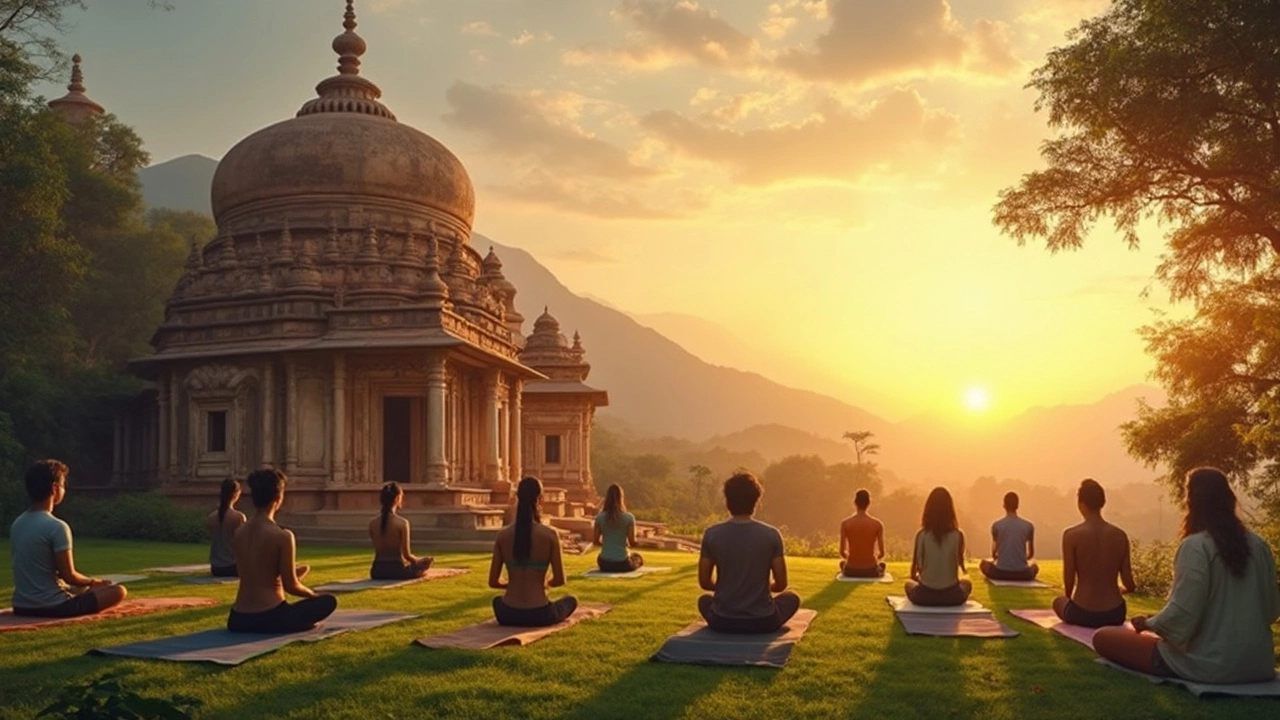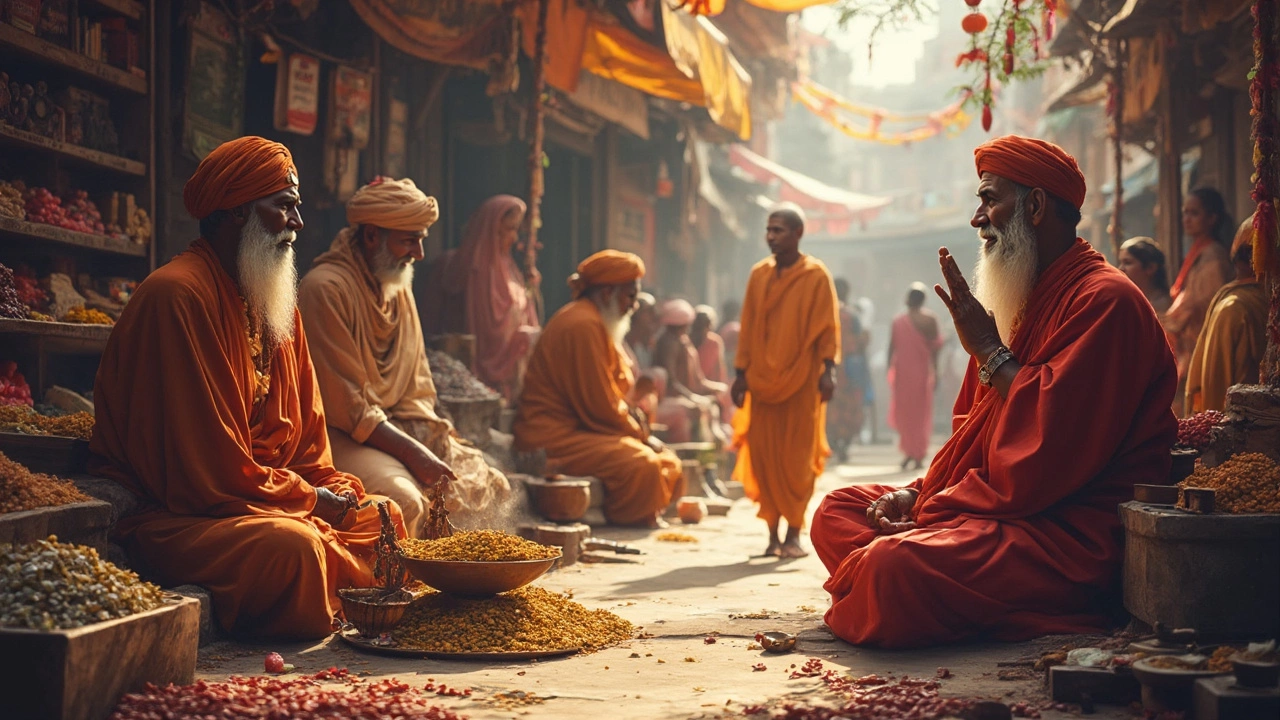Is India the World's Spiritual Heartland?
 Mar, 16 2025
Mar, 16 2025
India is often seen as the spiritual heartbeat of the world. But why does this country have such a strong spiritual vibe? For starters, it's got a long history of diving deep into the mind and spirit. This is where yoga, meditation, and some of those deep spiritual quotes you've probably heard come from. Ever tried chanting 'Om' or sitting with your thoughts? Those simple actions trace their roots back to ancient Indian practices.
Even in today's fast-paced world, India's spiritual practices haven't lost their charm. People worldwide go all the way to India to soak in these vibes, hoping to find peace or purpose. And let's not forget the spiritual figures who've shared insights with wisdom that still resonates today. So stick around, and let's explore what makes India such a mecca for spirituality.
- India's Spiritual Heritage
- Philosophies and Practices
- Influential Spiritual Figures
- Modern-Day Spiritual Influence
India's Spiritual Heritage
When we talk about spirituality, India often tops the list. This land has been a melting pot of religions and philosophies for thousands of years. It’s like the ultimate spiritual retreat where countless seekers have found inspiration and enlightenment.
Ancient Faiths
One of the oldest known spiritual texts comes from India—the Vedas, which date back to 1500 BCE. These ancient scriptures laid the groundwork for what we now see in practices like Hinduism and Buddhism. And speaking of Buddhism, it's here that Siddhartha Gautama found enlightenment under the Bodhi tree, carving a distinct path of mindfulness and compassion that millions follow today.
Birthplace of Yoga
Let's not forget that India is the birthplace of yoga, an ancient practice that’s become a global phenomenon. While many hit the mat for exercise, yoga in India is deeply spiritual. It’s about union—of body, mind, and spirit.
Spiritual Learnings Through Time
India's spiritual teachings didn't stay put. They've traveled through texts like the Bhagavad Gita and teachings of spiritual leaders like Mahatma Gandhi. His principle of ahimsa, or non-violence, became a powerful tool for social change and has been adopted by movements worldwide.
| Year | Event |
|---|---|
| 1500 BCE | Vedas composed |
| 500 BCE | Buddhism founded |
| 5th Century CE | Bhagavad Gita's emergence |
| 20th Century | Mahatma Gandhi's Movement |
In India, spirituality isn't just a private affair. Festivals like Diwali and Holi bring entire communities together in celebration of light, color, and the triumph of good over evil. So, whether you’re looking for spiritual guidance or just curious about what makes India's spiritual landscape so rich, there’s a wealth of history and knowledge waiting to be explored.
Philosophies and Practices
When it comes to spirituality in India, the philosophies and practices are as old as the hills. We're talking about stuff that's been around for thousands of years, influencing not just Indians but people around the globe.
Meditation and Mindfulness
Meditation is one of India's major exports in the world of spirituality. It's a way to calm the mind, which takes some practice if you've got a lot running up there. From Buddhist practices to those found in Hindu yogic philosophies, there's a method for just about everyone. You get to pick from techniques like Vipassana, focused on observing your breath, to Transcendental Meditation which involves silently repeating a mantra.
Yoga: More Than Just a Workout
Sure, yoga is great for burning calories, but it's much more than a physical workout. Rooted in Indian spirituality, it's all about uniting your mind, body, and spirit. Originally, it was developed as a path to spiritual enlightenment, long before it became a staple at gyms.
Philosophical Schools: A Deep Dive
India boasts a smorgasbord of philosophical schools. Ever heard of Vedanta or Samkhya? They're part of the six classical schools of Indian philosophy. Each offers different ideas on how to live well and understand the universe. Vedanta, for example, teaches that the self (Atman) and the absolute (Brahman) are one. It’s a mind trip that keeps both scholars and spiritual seekers coming back for more.
The Bhakti Movement
This movement, which stresses devotion to a personal god, brought spirituality to the masses. Popular between the 7th and 12th centuries, the Bhakti Movement created a path away from the rigid caste system, letting anyone and everyone bask in spiritual love through songs, prayers, and rituals.
Overall, these philosophies and practices are more than just old books or ancient chants. They're active, evolving traditions that continue to be alive in India's everyday life, offering insights and paths for anyone looking to explore spirituality.

Influential Spiritual Figures
When diving into India's rich tapestry of spirituality, it's hard to overlook the contributions of its prominent spiritual figures. These personalities have not only shaped Indian culture but have also left a mark on global spirituality.
Swami Vivekananda
First up is Swami Vivekananda, who brought Indian philosophies like Vedanta and Yoga to the Western world in the late 19th century. Known for his famous speech at the 1893 Chicago World Parliament of Religions, he introduced the Western audience to India's rich spiritual heritage.
Paramahansa Yogananda
Then there's Paramahansa Yogananda, best known for his book 'Autobiography of a Yogi,' which has become a spiritual classic. This book has inspired countless spiritual seekers worldwide, including influential figures like Steve Jobs, who famously read it every year.
Mahatma Gandhi
Although widely recognized for his role in India's fight for independence, Mahatma Gandhi's influence goes beyond politics. His adherence to truth and non-violence was deeply spiritual, drawing inspiration from India's ancient scriptures.
Sri Sri Ravi Shankar and Sadhguru
In modern times, figures like Sri Sri Ravi Shankar and Sadhguru continue to spread the essence of Indian spirituality globally. Through their respective organizations, The Art of Living and the Isha Foundation, they offer guidance on meditation, personal development, and healthy living.
Here's a quick look at how these figures have influenced spirituality globally:
| Figure | Key Contribution | Global Impact |
|---|---|---|
| Swami Vivekananda | Introduced Vedanta and Yoga to the West | Foundation for global interest in Yoga |
| Paramahansa Yogananda | 'Autobiography of a Yogi' | Shift in Western perception of Indian spirituality |
| Mahatma Gandhi | Principles of non-violence | Inspired civil rights movements worldwide |
| Sri Sri Ravi Shankar | Art of Living Foundation | Global courses on meditation and stress relief |
| Sadhguru | Isha Foundation | Promotes well-being and inner transformation |
Whether you're quoting a passage from Yogananda's writings or practicing meditation as endorsed by Sadhguru, these figures have made it easy for anyone seeking spiritual wisdom to find a path. They truly highlight why India is seen as a hub of spiritual energy.
Modern-Day Spiritual Influence
Today, India remains a major attraction for those seeking spiritual enlightenment and wellbeing. This isn't just because of its rich past but also due to how actively its spiritual practices are woven into the present. Globally, the popularity of yoga isn't just a phase—it's a lifestyle that's been adopted by millions worldwide. Originating in India, yoga practices are touted for their holistic benefits, from physical fitness to mental clarity.
Global Reach of Indian Spirituality
Thanks to globalization, spiritual tourism is booming. Millions of visitors flock to Indian ashrams and spiritual retreats yearly. Places like Rishikesh, dubbed the 'Yoga Capital of the World', attract everyone from hardcore yogis to curious travelers. India's spiritual sanctuaries have become melting pots of cultures, where discussions range from spiritual quotes to advanced meditation techniques.
Indian spiritual teachers, like Sadhguru and guru Amma, have gained international followings. Their teachings blend age-old philosophies with modern-day sensibilities, making them relatable to people across cultures. A quote that resonates widely is from Sadhguru:
"The purpose of yoga is to live a life of grace and favor."Simple yet profound, it encapsulates the ethos of India’s spiritual wisdom.
Influence of Indian Spiritual Figures
Another factor is the global impact of spiritual figures born in India. Take the Dalai Lama, whose teachings on compassion and happiness have inspired countless individuals across the globe. The timelessness of such teachings continues to offer guidance in an uncertain world.
In recent years, many have turned to Indian spirituality to combat modern ailments like anxiety and stress. Meditation apps often incorporate spirituality elements borrowed from Indian concepts, offering guided sessions rooted in traditional practices.
The Data Speaks
To give you an idea of the reach: a recent survey showed that out of every ten international visitors to India, three are there mainly for spiritual purposes. And yoga itself has become a $37 billion industry worldwide.